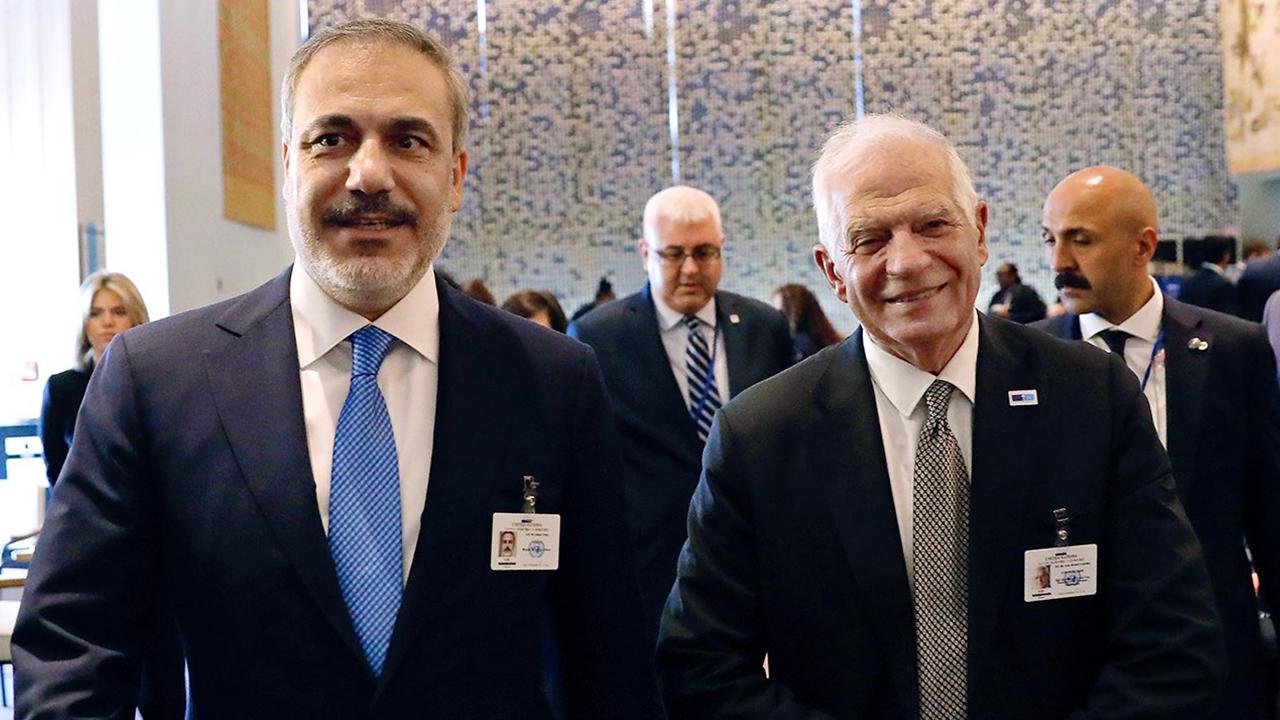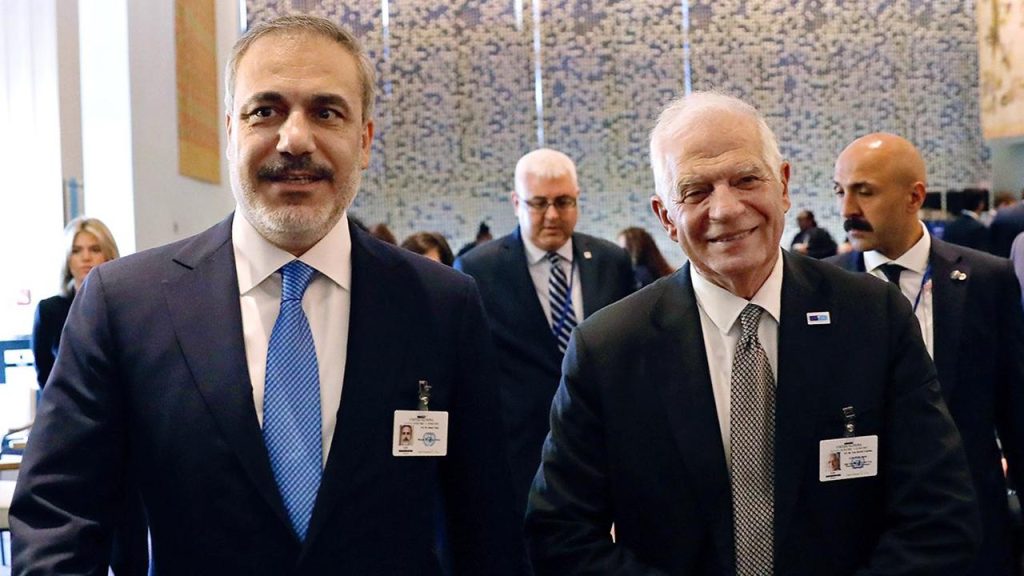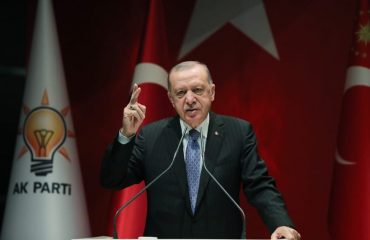

After a 5-year interval, EU High Representative Borrell invited Türkiye to the informal foreign ministers’ meeting, but the messages he gave before Foreign Minister Fidan’s participation in the meeting were not positive from Ankara’s perspective. The EU sees Türkiye more as a rival than a candidate member. The photograph is from UN activities in September 2023.
Just before Foreign Minister Hakan Fidan’s participation in the informal ‘Gymnich’ meeting of European Union Foreign Ministers on August 29, EU Commission Vice President and High Representative Josep Borrell finally revealed the Union’s common thought towards Türkiye. Borrell’s message before the meeting, to which Türkiye was invited for the first time after a 5-year interval, was not exactly a warm ‘Welcome’ message to Fidan.
As he spoke at the Quo Vadis Europa conference in Santander, Spain on 25 August, he pointed out that “Growing Russian and Turkish influence in North Africa has derailed the EU’s ‘Mediterranean order’ in the region”.
“We should be worried about what’s happening in Africa. When I first came to Brussels, the French and Italians were in Libya. They weren’t always in harmony, but they were present. Today, there are no Europeans left in Libya – only Turks and Russians,” he added.
“The bases along Libya’s coast are no longer European; they belong to Türkiye and Russia. This is not the Mediterranean order we envisioned,” he said.
Borrell paradox: From candidate to rival
These few sentences demonstrate two things. Firstly that the EU does not consider Türkiye as a candidate but a rival and most importantly not a European country. Relations between Türkiye and the European Union has deteriorated ever since the July 2016 coup attempt. Efforts to reconcile have failed. As the Union was suffering from a major migrant wave in the summer of 2015 up until spring 2016 the EU made an arrangement with Türkiye to stop the flow. The two negotiated agreements did exactly that. In return Türkiye wished to put the relationship, which was already suffering for political reasons for some time, back on track.
The main points were the unblocking the accession process, modernising the Customs Union and providing visa exemption for Turkish citizens as well as increasing dialogue at all levels. The only outcome was the EU providing six billion € for the Syrians residing in Türkiye, which was actually a bargain. The EU found several reasons for not upholding its end of the deal.
The two main reasons
There are two evident reasons for this. One is the perennial Cyprus issue. As long as this question remains unsolved there will always be at least one veto to prevent any progress. The second is Türkiye’s poor record on human rights, the rule of law and freedom of speech. The EU has put positive developments on these matters as conditions for any improvement in the files mentioned above.
While progress on democracy and the rule of law is definitely in the interest of Türkiye, nobody should expect any development on the Cyprus issue. Multiple United Nations efforts have failed to reconcile the two communities on the Island. As long as the Greek Cypriots refuse to treat the Turkish Cypriots on an equal basis there will be no hope for a lasting agreement. And since the Greek Cypriots are treated as the legitimate side by the EU and others, they have no incentive to change their attitude. The Greek Cypriots were counting on Türkiye’s accession process to force Ankara to make concessions. However, the other EU members, especially France and Germany, prevented that from happening as they distanced Türkiye by blocking meaningful dialogue. Although the accession process started in 2005, it stalled after a while. The EU did not invite Türkiye to any summits after 2004 until the migration crisis. France even mentioned that the resolution of the Cypriot problem would not be enough.
The real reason Türkiye was kept at arms-length is that in addition to those mentioned above there are several countries that do not want to see Türkiye as a member. It is true that enlargement is put on hold but EU representatives at least pay lip service to the other candidates. The remaining countries of the former Yugoslavia, Bosnia- Herzegovina, Kosovo, Montenegro, North Macedonia and Serbia as well as Albania are candidates as are Georgia, Moldova and Ukraine. Türkiye is not mentioned ln this context any more. Yet when the EU asks all candidates to follow EU sanctions against Russia it then remembers Ankara.
The real reasons
The major reason is unfortunately cultural. Even if the EU does not have religion or culture as criteria for membership it exists implicitly. One last consideration against Türkiye is its size as it would have the rights and privileges as Germany if it became a member. So unless the EU changes its structures or establishes different kinds of memberships Türkiye has no chance of joining the Union.
Türkiye’s accession to the European Union is now academic. It will not happen unless the EU and Türkiye changes. It is true that Türkiye has also made statements as if it were not part of the West anymore. For example, statements against NATO, of which we are a member, are considered perplexing, but if the EU had kept its promises and not alienated Türkiye, we would now be in a completely different situation.
Surprise invitation of Borrell
Turning back to Borrell, there has been a surprising development as the High Representative invited Türkiye to the informal Foreign Affairs Ministers Gymnich meeting to be held on August 29 in Brussels. Normally this meeting should be held in Hungary who holds the rotating Presidency of the EU. However, there was an initial spat between Hungary and the other members. Many EU countries were not happy with Budapest’s foreign policies and decided to boycott the meeting by organising one of their own in Brussels on the same day. It seems they have resolved this unpleasant situation and now there will only one meeting.
If Türkiye and the EU were going to reconcile they needed to find a way to start somewhere and the Gymnich meetings were the practical way to do it. These are informal and no formal decisions are taken. Türkiye used to be invited to these meetings along with the other candidates. The last meeting Türkiye attended was during the Romanian Presidency in the first half of 2019.
Last year Council members asked Borrell to find a way to deal with Türkiye. Amongst his recommendations was to invite Türkiye to the Gymnich meetings.
Hungary effect?
It is in fact his prerogative to invite members and third parties to these meetings. The country holding the Presidency has only limited say over who will be invited. Yet maybe Foreign Minister Hakan Fidan was invited due to the close relations between Hungary and Türkiye. In the light of Borrell’s latest remarks it will be interesting to hear what kind of a discussion will take place.
The expectation is that former Estonian Prime Minister Kaja Kallas will take the foreign policy portfolio from Borrell when the new European Commission is established in December. Let us hope that she will be more assertive and careful in handling this file.
Rather than talk about past grievances or try to address issues that are beyond their purview at this meeting, it would be wise to discuss common ground and start cooperating in certain areas of mutual concern. If there is any possibility to reconcile, both sides should remember that Türkiye is a candidate. The EU should treat Türkiye as such and Ankara should act accordingly.
EU-Türkiye relations in numbers: Giving up chasing membership


